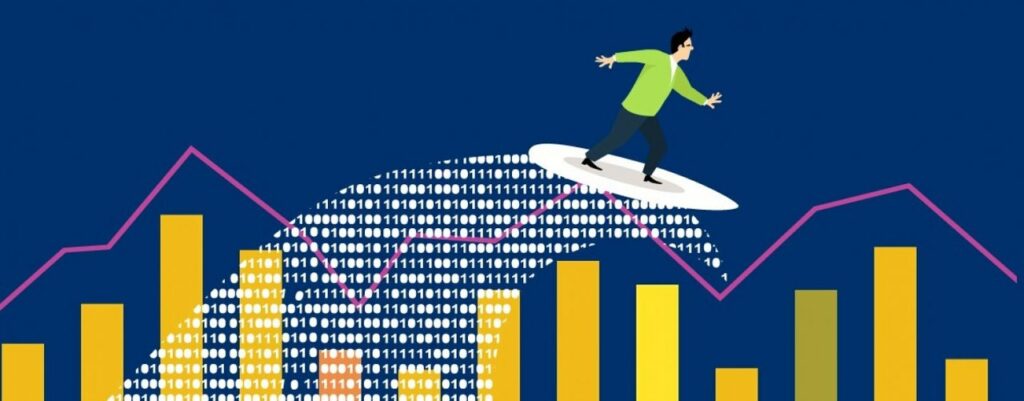When it comes to jobs of the future, this job keeps always popping up in the top ten lists: The Data Scientist – according to Harvard Business Review one of the coolest jobs of the 21st century.
The Tasks of a Data Scientist
What does a data scientist actually do and what makes this profession so valuable for future work?
No question, data is the new oil. On the top ranks of the most successful companies worldwide are no longer oil and gas companies, but Google, Facebook, and Apple. Therefore, the evaluation of data is of the highest relevance. In the past, the collected data of an average production operation could be easily evaluated by standard data software. With the ever-increasing amount of data, so-called Big Data, the complexity has increased and this is no longer so easy to implement. The data mountains are piling up in clouds, data lakes, and servers. In short: An expert is needed who is able to evaluate, analyze and interpret huge amounts of data. A new job description was created: The birth of the data scientist. This was already recognized about 10 years ago.
In the meantime, the demand for data scientists is so high that many positions in large companies and start-ups remain unfilled. In addition, there are still very few special courses of study, such as Informatics – Data Science at City University London.
Data Scientists are desperately sought after in the economy and are therefore in great demand.
[ot-video][/ot-video]
As a lateral Entrant to Data Scientist
Who can become a Data Scientist by lateral entry? The obvious candidates are, for example, graduates of mathematics, statistics or computer science. Data Science is an interdisciplinary field that combines knowledge from statistics, machine learning and analytics. Most employers require a university degree. The following programming languages are desired for recruitment: SQL, R, Python, Java, SPARK.
Deep learning, machine learning or artificial intelligence should not be a blank slate for candidates either.
As you can see from the job title, you should have a sound knowledge of data. In addition, one should be able to explain one’s own findings to an audience that does not necessarily have specialist knowledge. A nerd who prefers redundant endless technical terms and prefers to pursue his research in a dark cellar, isolated from the rest of the world, is out of place here. Dare to present your insights to a larger audience! Do not hide your light under a bushel. Put a crown on your inner scene stealer and grab the microphone. Your insights are important. After all, the insights can make the difference whether a project is approved or a new product is launched.
Silke Müller, Data Scientist at Yokogawa, advises young graduates with a view to the process industry as follows:
It is not about being the best programmer or mastering every algorithm in your sleep. It is also important to have basic knowledge of process engineering and to be familiar with the respective industry so that you can exchange technical information with your colleagues. If, for example, you want to carry out a process optimization and have no understanding of how the process engineering process works, you will encounter considerable difficulties. How can you get information from colleagues if you cannot ask specific questions? Are the models okay? A model is not helpful if it has learned data by heart without reproducing correlations correctly.
An Example: Data Science for Predictive Maintenance
Sensors can be used to collect data on the status quo of machines for predictive maintenance. The collected data is processed by data scientists so that, for example, a production engineer can specifically evaluate the condition of the machine. In this way, machine failure can be predicted before it occurs. On the basis of the processed data, it is possible to recognize when a machine is continuously producing less power than before. Accordingly, the machine can be serviced or replaced according to its condition.
Why the Data Scientist has the Potential to become your Dream Job
On the one hand, there is clearly a shortage of skilled workers in this profession, i.e. the right applicants can choose their employer. If you enter the search term “Data Scientist” at Germany’s most popular job exchange, 721 hits are currently displayed throughout Germany. Isn’t that fantastic?
Even if jobs become obsolete due to automation, the Data Scientist is one of the professions that will not be affected by this. On the contrary, automation processes and artificial intelligence work together with the Data Scientist. The more precise the data supplied, the more accurate the Data Scientist’s evaluations will be.
“Interdisciplinarity is”, according to Silke Müller, “one of the reasons why I particularly enjoy working as a data scientist. I work together with colleagues from marketing and sales and am responsible for projects on a pan-European level”.
As a generalist, the data scientist must quickly familiarize himself with new conditions, industries, and topics – there is no room for boredom. The analyses do not remain in the dark laboratory but are presented to stakeholders and important decision-makers such as management. We are convinced: A real dream job with a bright future.
Picture Credits: aleutie- stock.adobe.com




